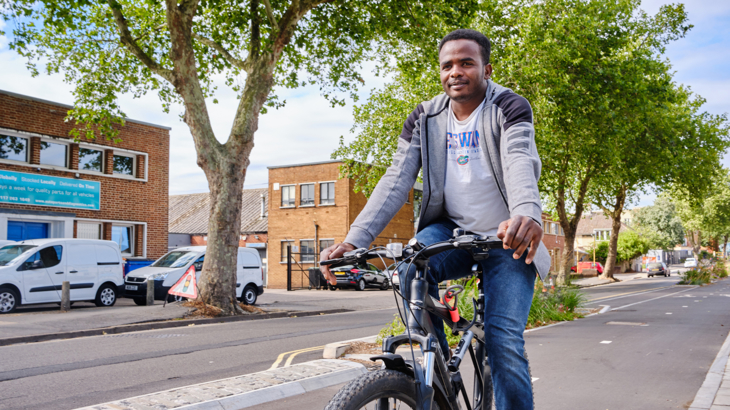Spatial planning
Spatial planning policy must be reformed for everyone to lead happier, healthier lives.
We're calling for changes to spatial planning policy in England
Our vision is of a society where the way we travel creates healthier places and happier lives for everyone.
And we believe that reform in the planning system has a vital role to play in achieving that vision.
That’s why we’re working as part of the Better Planning Coalition to seek legislative amendments to the Levelling Up and Regeneration Bill, and revisions to the National Planning Policy Framework.
What’s wrong with spatial planning policy?
We think the planning system should be a key tool in helping the UK to level up communities, reduce car dependency and meet its legally binding net zero targets.
But at present, there is no legal duty for the planning system to deliver healthy and inclusive environments.
Instead, new developments can perpetuate car dependency and all the problems associated with it:
- carbon emissions
- air pollution
- congestion
- transport poverty
- poor health.
With upcoming revisions to the National Planning Policy Framework due, we have a significant opportunity to put this right.

Felicity
A pleasant urban environment should entice people in to spend time and money.
You also want your child to have independence, to roam, to go out and see their friends.
Photo: Brian Sweeney/Sustrans
What's the National Planning Policy Framework?
The National Planning Policy Framework (NPPF) is a UK Government policy document.
It sets out the overarching policy guidelines for people wanting to develop land in England.
This makes it an important tool in shaping our built environment.
It defines how the places where we live, work and rest will look for decades to come.
The government has committed to revising the NPPF as part of the Levelling Up and Regeneration Bill, announced in the Queen’s Speech in May 2022.

Photo: Jon Bewley/Sustrans
What changes does Sustrans want to see?
The amendments we’d like to see in the NPPF originate from the Better Planning Coalition’s six tests for planning.
The Better Planning Coalition, is a broad coalition of 26 organisations from across a range of sectors.
They work collaboratively to maximise their influence on the Levelling Up and Regeneration Bill and the review of the NPPF for the benefit of climate, nature and people.
Sustrans’ proposed amendments are as follows:
- There should be new and strengthened legal duties on the part of local planning authorities to reduce carbon emissions in respect of net zero. These must include the reduction of associated road transport emissions and improvements in air quality.
- The NPPF should embed a more integrated spatial planning approach to plan-making and decision taking. Requiring our land use, planning and transport planning systems to be more joined up in policy making and delivery.
- The NPPF should be clear that planning policies and decisions must deliver healthy and inclusive development, including new major development in accordance with the 20 minute neighbourhood principle.
- There should be a new strategic policy in the NPPF for the delivery of high quality and inclusive walking and wheeling environments. Including streets and other routes with a particular focus on walkable proximity to local services and facilities.
- The NPPF should be clear that planning policies and decisions must provide for and deliver high quality cycling environments to enable people of all ages and abilities to cycle safely for their everyday local journeys.
- The National Cycle Network should be protected and enhanced through planning policies and decisions, and promoted as such in the NPPF as an asset of national importance, as with National Trails.

Lindsey
The absolute ideal would be a liveable neighbourhood so that all the streets in this area were just for access.
The kids could play outside more, more space for people and cleaner air.
Photo: Jon Bewley/Sustrans
We're here to help and share our expertise. Contact our Partnerships team to discuss how we can support you.

Partnerships team


